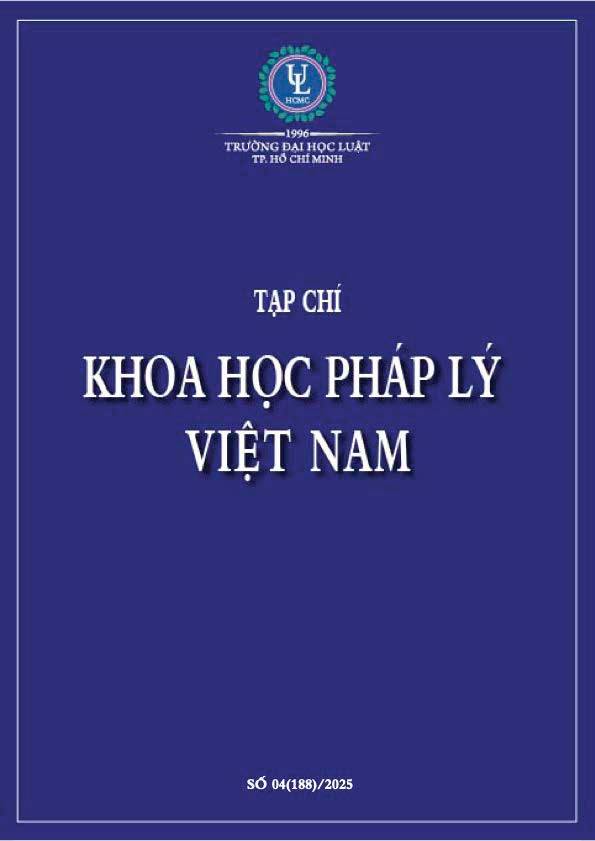MIỄN TRỪ TÀI PHÁN HÌNH SỰ DƯỚI GÓC ĐỘ PHÁP LUẬT QUỐC TẾ VÀ PHÁP LUẬT VIỆT NAM
DOI:
https://doi.org/10.70236/tckhplvn.252Từ khóa:
miễn trừ tài phán hình sự, pháp luật quốc tế, pháp luật tố tụng hình sựTóm tắt
Bài viết này nghiên cứu chế định miễn trừ tài phán hình sự trong lý luận và thực tiễn của pháp luật quốc tế. Từ đó, tác giả đối sánh với quy định pháp luật Việt Nam nhằm chỉ ra những điểm bất tương thích với pháp luật quốc tế cũng như những nội dung còn thiếu sót của pháp luật Việt Nam nhằm kiến nghị hoàn thiện pháp luật.
Tải xuống
Tài liệu tham khảo
[1] Dapo Akande and Sangeeta Shah, “Immunities of state officials, international crimes, and foreign domestic courts”, European Journal of International Law, Vol. 21(4), 2010
[2] Rosane Van Alebeek, The immunity of states and their officials in international criminal law and international human rights law, Oxford University Press, 2008
[3] Harold J. Berman & James W. Spindler (trans), Soviet criminal law and procedure: The RSFSR Codes, Harvard University Press, 1972
[4] Lê Văn Cảm, Sách chuyên khảo sau đại học: Những vấn đề cơ bản trong khoa học luật hình sự (Phần chung), Nxb. Đại học Quốc gia Hà Nội, 2005 [trans: Le Van Cam, Postgraduate specified book: The fundamental issues on criminal science (The general part), VNU Publishing House, Hanoi, 2005]
[5] Anthony J. Colangelo, “Jurisdiction, immunity, legality, and Jus Cogens”, Chicago Journal of International Law, Vol. 14, 2013
[6] Eileen Denza, Diplomatic law: Commentary on the Vienna Convention on diplomatic relations, Oxford University Press, 2016
[7] Joanne Foakes, The position of heads of state and senior officials in international law, Oxford University Press, 2014
[8] Elizabeth Helen Franey, “Immunity from the criminal jurisdiction of national courts”, in Alexander Orakhelashvili (ed.), Research Handbook on Jurisdiction and Immunities in International Law, Edward Elgar Publishing, 2015
[9] Alexandre Skander Galand, UN Security Council Referrals to the International Criminal Court: Legal nature, effects and limits, Brill, 2018
[10] Rina Goldenberg, “Abuse of diplomatic immunity: Is the government doing enough?”, ILSA Journal of International and Comparative Law, Vol. 1, 1995
[11] Quang Hòa, “Hội nghị tổng kết Pháp lệnh 1993 về quyền ưu đãi, miễn trừ”, Báo Thế giới và Việt Nam, 2022, [trans: Quang Hoa, “Conference to review the 1993 Ordinance on privileges and immunities”, The World and Vietnam Report, 2022]
[12] International Court of Justice, Case soncerning the arrest warrant of 11 April 2000 (Democratic Republic of the Congo v. Belgium), Judgment of 14 February 2002
[13] International Court of Justice, Difference relating to immunity from legal process of a special rapporteur of the Commission on Human Rights, Advisory Opinion of 29 April 1999
[14] International Law Commission, Report of the International Law Commission: Seventy-third session (18 April–3 June and 4 July–5 August 2022), United Nations, 2022
[15] International Law Commission, Yearbook of The International Law Commission 2001, vol. II(2), United Nations, 2007
[16] International Law Commission, Yearbook of The International Law Commission 2010, vol. II(1), United Nations, 2017
[17] Ramona Pedretti, Immunity of heads of State and State officials for international crimes, Brill, 2014
[18] Đinh Văn Quế, “Hiệu lực theo lãnh thổ, hiệu lực về thời gian của Bộ luật Hình sự năm 2015”, Tạp chí Kiểm sát, số 04, 2018 [trans: Dinh Van Que, “Territorial validity, time validity under Criminal Code 2015”, Prosecutorial Magazine, No. 04, 2018]
[19] Malcolm N. Shaw, International law, Oxford University Press, 2017
[20] Vũ Thị Thúy, “Nội luật hóa quy định của các điều ước quốc tế về quyền miễn trừ trong luật hình sự Việt Nam”, Tạp chí Khoa học pháp lý, số 5, 2015 [trans: Vu Thi Thuy, “Institutionalizing provisions of international treaties on immunity right into the Criminal Code of Vietnam”, Journal of Legal Sciences, No. 5, 2015]
[21] Trường Đại học Luật TP. Hồ Chí Minh, Giáo trình Công pháp quốc tế (Quyển 1), Nxb. Hồng Đức, 2021 [trans: Ho Chi Minh City University of Law, Textbook on International Public Law (Book 1), Hong Duc Publishing House, 2021]
[22] Trịnh Tiến Việt, “Từ khởi nguồn đến kết thúc của luật hình sự”, Tạp chí Khoa học Đại học Quốc gia Hà Nội: Luật học, số 1, 2018 [trans: Trinh Tien Viet, “From the beginning to the end of the criminal law”, VNU Journal of Science: Legal Studies, No. 1, 2018]
[23] Võ Khánh Vinh, “Hoàn thiện hệ thống pháp luật đáp ứng yêu cầu tiếp tục xây dựng và hoàn thiện Nhà nước pháp quyền xã hội chủ nghĩa Việt Nam trong giai đoạn mới (Kỳ II)”, Tạp chí Kiểm sát, số 17, 2023 [trans: Vo Khanh Vinh, “Completing legal system to meet the requirements of continuing to build and complete the Socialist rule-of-law State of Vietnam in the new period (Part II)”, Prosecutorial Journal, No. 17, 2023]






